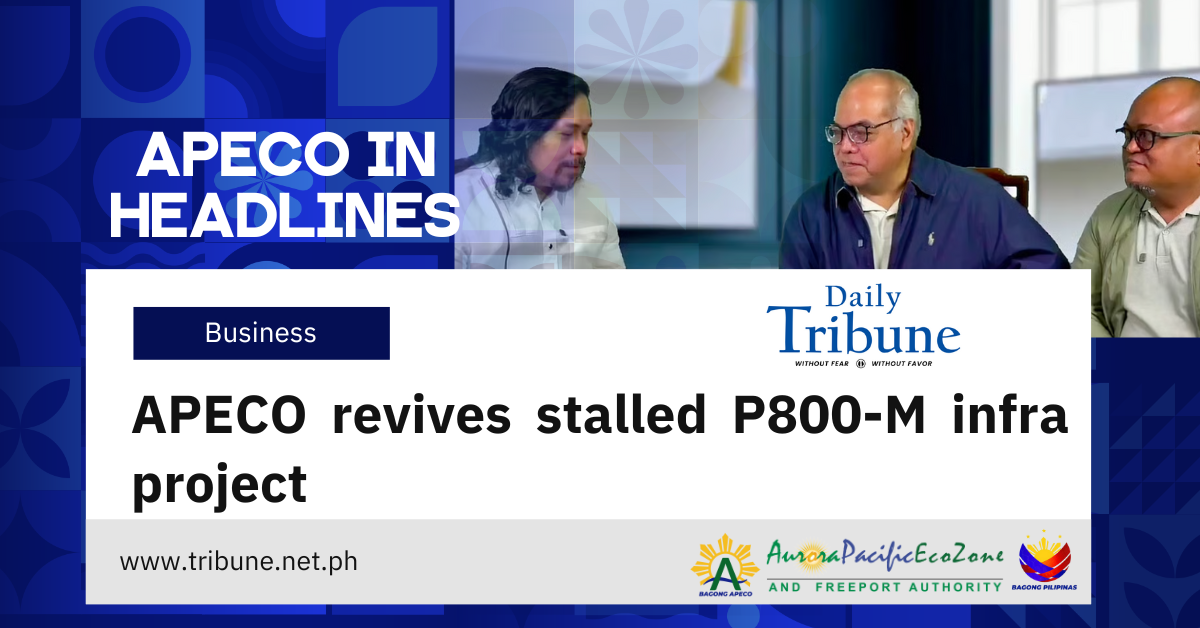
(28 July 2025, Manila) - The Aurora Pacific Economic Zone and Freeport Authority (APECO) is regaining investor confidence with the revival and rollout of nearly P800-million worth of long-abandoned infrastructure projects, positioning the northern Luzon economic zone for inclusive and sustainable growth.
Under APECO president and CEO Gil Taway IV, the economic zone has completed or reactivated 10 major infrastructure projects, many of which were dormant for years. These include utilities and public facilities essential to transforming APECO into an investment-ready hub.
“When I came in, there were a lot of infrastructure projects left abandoned,” said Taway in an interview on DAILY TRIBUNE’s Straight Talk hosted by Chito Lozada and Raffy Ayeng.
“Our focus is not just on completing what was left behind but ensuring that these projects align with the broader vision for inclusive, investor-driven development,” Taway said.
Among the completed projects are the P60-million Central Water Supply and Reservoir Phase 1, the P28-million Sewage Treatment Plant Phase 1, and the P12-million APECO Fire Station.
Other finished developments include the P44-million rehabilitation of the APECO Villas and Residences, the P16.83-million Super Health Center, and a P4.95-million Materials Recovery Facility.
The Underground Power Distribution Line, considered a critical backbone of the zone, is also nearing completion. Phase 1 is 98-percent complete, while the entire system — including Phase 2 — is 78-percent finished, funded with a combined budget of P70 million.
Infrastructure development continues with the P30-million Phase 2 of the water reservoir now 87-percent complete, while the delivery of P15 million worth of fire trucks and an ambulance stands at 50 percent.
Meanwhile, the P47-million Sewage Treatment Plant Phase 2 has moved into the pre-construction phase.
APECO has also restructured its flagship Corporate Campus Building, originally funded with P75 million as a ready-for-occupancy and ready-for-fit-out (RFO/RFFO) facility.
With only P17 million of that amount remaining, the building has been integrated into a broader Corporate Campus Development Program, originally allocated P439 million, but with only P103 million left.
To finance the campus redevelopment, APECO said it consolidated the remaining P120 million to proceed with the construction of the RFO/RFFO buildings, the 1,500-seat APECO Convention Center, and the P67.6-million APECO Grand Lagoon, which was augmented with an additional P4 million from cost savings.
Taway said that all previously awarded contracts linked to these abandoned projects were terminated in accordance with the rules of the Department of Budget and Management and the Commission on Audit, enabling APECO to realign resources transparently and lawfully.
Beyond infrastructure, APECO continues to fulfill its core mandate as an investment promotion agency. Taway said the agency is proactively attracting foreign direct investments as a long-term growth strategy.
“APECO is trying to contribute to national development,” he said.
“Our goals under our charter are to create jobs, generate economic activities and increase household consumption — ultimately to uplift the living conditions in Aurora and neighboring provinces,” he added.
Inclusivity also plays a central role in APECO’s current direction. Taway said that when he assumed office, the agency had only 22 Indigenous Peoples (IPs) in its workforce.
Today, that number has nearly tripled to 61. Many of the IPs are serving as forest rangers and administrative staff within the zone.
“It’s not enough that we create jobs or generate economic activities. We have to be inclusive,” he said.
APECO spans nearly 13,000 hectares — 496 hectares under Phase 1 and 12,242 hectares under Phase 2.
The news article was first featured on the Daily Tribune by Jason Mago. To view the article, click here.
